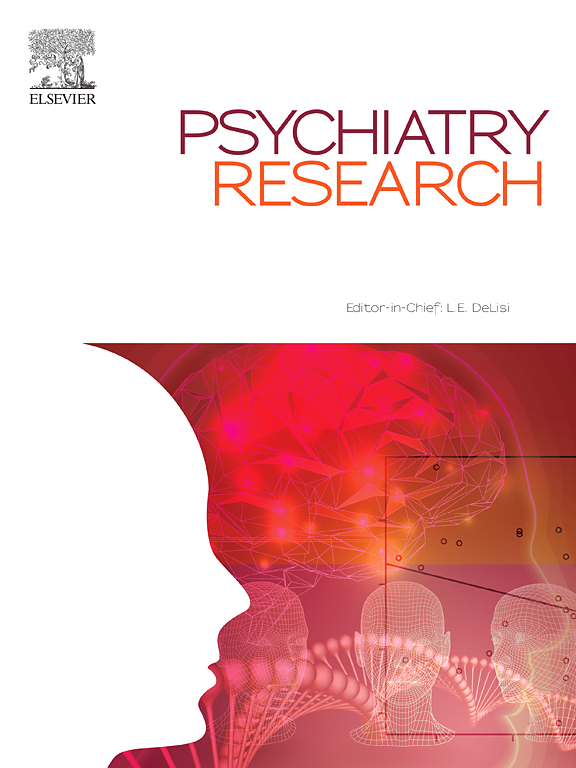The role of sleep quality in mediating the relationship between habenula volume and resilience
IF 4.2
2区 医学
Q1 PSYCHIATRY
引用次数: 0
Abstract
Background
Our human volumetric MRI study (Dai et al., 2024) demonstrated that habenula (Hb) volume is associated with psychological resilience, a key protective factor against depression. However, the biological mechanisms underpinning this relationship remain unclear. A recent animal study highlighted that neuronal activity in the Hb modulates rapid eye movement (REM) sleep, influencing depressive behaviors during wakefulness. Based on this, we hypothesized that sleep quality mediates the relationship between Hb volume and psychological resilience in humans.
Methods
We utilized a deep learning-based automated segmentation model to estimate Hb volume from 3T-MRI T1-weighted images of 84 healthy participants. Correlation analyses were performed to examine the relationship between Hb volume and questionnaire-based assessments of sleep quality. Mediation analysis was then conducted with Hb volume as the independent variable, psychological resilience as the dependent variable, and sleep quality as the mediator.
Results
Hb volume was found to be negatively correlated with sleep disturbance, indicating that individuals with larger Hb volumes experienced better sleep quality. A lateralization effect was also observed, where greater leftward asymmetry (larger left Hb volume compared to right) was associated with more severe sleep disturbances. Moreover, sleep quality was identified as a mediator in the relationship between Hb volume and psychological resilience.
Conclusion
This study provides preliminary evidence of the association among Hb volume, sleep quality, and resilience. Sleep quality appears to be a critical mediator in the biological processes linking smaller Hb volumes to decreased psychological resilience. Enhancing sleep quality may be a promising approach for bolstering psychological resilience and reducing the risk of depression.
睡眠质量在缰带体积和弹性之间的中介作用。
背景:我们的人体体积MRI研究(Dai等人,2024)表明,缰核(Hb)体积与心理弹性有关,这是预防抑郁症的关键保护因素。然而,支撑这种关系的生物学机制仍不清楚。最近的一项动物研究强调,Hb中的神经元活动调节快速眼动(REM)睡眠,影响清醒时的抑郁行为。基于此,我们假设睡眠质量介导了人类Hb体积与心理弹性之间的关系。方法:我们利用基于深度学习的自动分割模型从84名健康参与者的3T-MRI t1加权图像中估计Hb体积。进行相关分析以检查Hb体积与基于问卷的睡眠质量评估之间的关系。以Hb体积为自变量,心理弹性为因变量,睡眠质量为中介变量进行中介分析。结果:Hb体积与睡眠障碍呈负相关,表明Hb体积越大的个体睡眠质量越好。侧化效应也被观察到,更大的左脑不对称(与右脑相比,左脑体积更大)与更严重的睡眠障碍有关。此外,睡眠质量被确定为Hb体积和心理弹性之间关系的中介。结论:本研究为Hb体积、睡眠质量和恢复力之间的关系提供了初步证据。睡眠质量似乎是一个关键的中介在生物过程连接较小的Hb体积降低心理弹性。提高睡眠质量可能是一种很有希望的增强心理弹性和降低抑郁风险的方法。
本文章由计算机程序翻译,如有差异,请以英文原文为准。
求助全文
约1分钟内获得全文
求助全文
来源期刊

Psychiatry Research
医学-精神病学
CiteScore
17.40
自引率
1.80%
发文量
527
审稿时长
57 days
期刊介绍:
Psychiatry Research offers swift publication of comprehensive research reports and reviews within the field of psychiatry.
The scope of the journal encompasses:
Biochemical, physiological, neuroanatomic, genetic, neurocognitive, and psychosocial determinants of psychiatric disorders.
Diagnostic assessments of psychiatric disorders.
Evaluations that pursue hypotheses about the cause or causes of psychiatric diseases.
Evaluations of pharmacologic and non-pharmacologic psychiatric treatments.
Basic neuroscience studies related to animal or neurochemical models for psychiatric disorders.
Methodological advances, such as instrumentation, clinical scales, and assays directly applicable to psychiatric research.
 求助内容:
求助内容: 应助结果提醒方式:
应助结果提醒方式:


